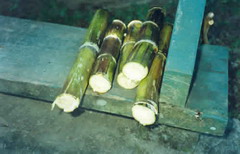Cuba-Venezuela: Making biofuels without wasting food
- Submitted by: admin
- Science and Technology
- Politics and Government
- 03 / 07 / 2007

Official Cuban sources described the cooperative alcohol programme between the two countries as part of their "joint efforts" to protect the environment, reduce consumption of fossil fuels and promote alternative energy sources, while holding fast to the principle of not using edible crops to make fuels.
At present Venezuela imports Brazilian ethanol to mix with gasoline distributed in the eastern part of the country, in preference to methyl tert-butyl ether (MTBE), an oxygenate additive which is a pollutant.
The Venezuelans "are planning to add eight percent ethanol to petrol in the first instance," said the head of the state Cuban Institute of Research on Sugarcane Derivatives, Luis Gálvez, on a television panel programme on alternative energy, in which experts warned that the rush to produce fuel alcohol could threaten food production.
Venezuela is planning to grow 276,000 hectares of sugarcane, to produce some 25,000 barrels per day (bpd) of fuel ethanol from bagasse, the plant matter left over after the sugar has been extracted.
Along with a wide range of cooperation projects totalling 1.5 billion dollars agreed on Feb. 28, the two governments signed an agreement to instal 11 ethanol plants in Venezuela and develop sugarcane production there.
On that occasion, Cuban Sugar Minister Ulises Rosales del Toro and Venezuelan Energy Minister Rafael Ramírez also signed contracts for supplying the first four plants, according to a detailed report published in the local daily Granma.
"Cuba is playing an important role, not only in supplying Venezuela through several of our sugar mills, but also with cooperation on technological aspects," Gálvez said.
The official defended alcohol production from sugarcane rather than from cereals like maize, which the United States uses as raw material for its entire ethanol consumption. The U.S. is the world's second largest producer of alcohol, after Brazil.
According to Gálvez, sugarcane is the best answer to three of humanity's pressing concerns, namely food, energy and the environment.
"Sugarcane production today is inevitably linked to alcohol and energy, for economic and market reasons," said Gálvez, citing Brazil, the world leader in producing fuel alcohol, as a prime example of "flexible production."
Expert sources consulted by IPS estimated that a ton of sugarcane bagasse can yield between 65 and 90 litres of alcohol. They emphasised that as the source is biomass, the fuel alcohol produced does not contribute to global warming.
Other experts participating in the forum on Cuban state television were insistent on the danger posed by the global biofuels fever to developing countries, as industrialised nations "talk of substituting one (energy) source for another, without changing their current patterns" of high consumption.
"What they are considering is a scheme in which most of the biofuels are produced in underdeveloped countries in Asia, Latin America or Africa, to be exported to the industrialised world," said Ramón Pichs, of the World Economy Research Centre (CIEM).
According to this model, developing countries would provide large areas of their cultivable land and cheap labour, and suffer a negative impact on food production and the environment, he said.
According to Pichs' calculations, filling a car's five-gallon tank with biofuel for two weeks would consume the amount of grain that would feed 26 people for a year.
The surge of interest in biofuels is caused by the drawbacks of using fossil fuels: high oil prices, their role in global warming, and their non-renewable nature as an energy source.
In 2002, Cuba restructured its sugar industry, closing down half of its 156 factories and cutting sugarcane cultivation. Now it is interested in manufacturing fuel alcohol, primarily for export.
It has therefore modernised at least 11 of its 17 distilleries, and intends to build seven new plants. These will be devoted to producing fuel grade dehydrated (anhydrous) ethanol, treated to remove the four percent of water contained in ordinary distilled alcohol.
The programme requires an investment of between 100 and 150 million dollars, and will increase ethanol production to about 500 million litres a year, from its current base of between 100 million and 150 million litres a year.
Cuba and Venezuela have close political and economic ties, and are promoting an integration strategy known as the Bolivarian Alternative for the Americas (ALBA), which Bolivia joined in 2006, as did Nicaragua after Daniel Ortega became president on Jan. 10.
Under the terms of an energy agreement in force since 2000, Venezuela supplies Cuba with 93,000 to 100,000 bpd of oil, as well as technological support for developing oil and gas production on this Caribbean island.
After the meeting in Havana to assess the progress of a wide-ranging integrated cooperation agreement in force for over six years, the two countries agreed to stimulate development of new energy sources in Cuba and Venezuela that will also benefit "other sister nations."
Source: IPS
Comments